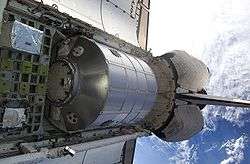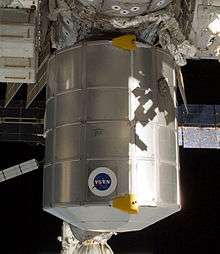Thales Alenia Space
.png) | |
| Industry | Aerospace |
|---|---|
| Predecessor | Alcatel and Finmeccanica |
| Headquarters | Cannes, France |
Key people | Jean-Loïc Galle, President and CEO |
| 2 billion € (2015)[1] | |
Number of employees | 7,980 (2016)[1] |
| Parent | Thales Group & Leonardo |
| Website |
www |

Thales Alenia Space is a Franco-Italian aerospace manufacturer formed[2] after the Thales Group bought the participation of Alcatel in the two joint-ventures between Alcatel and Leonardo, Alcatel Alenia Space and Telespazio.[3] The company is Europe's largest satellite manufacturer.[4]
History
Alcatel Alenia Space was established on June 1, 2005 by the merger of Alcatel Space and Alenia Spazio and was owned by Alcatel-Lucent (67%) and Finmeccanica (33%).
The creation of the company was concurrent with the creation of Telespazio Holding. This too was a merger of Finmeccanica and Alcatel businesses (Telespazio and Alcatel's Space Services and Operations respectively).
On April 5, 2006 Alcatel agreed to sell its share of Alcatel Alenia Space (and its 33% share of Telespazio) to Thales Group.[5]
The European Union agreed in this financial operation on April 10, 2007.[6]
Activities
The company built the Multi-Purpose Logistics Modules, which was used to transport cargo inside the Space Shuttle orbiters. They also built several modules for the International Space Station, those modules are: Cupola, Columbus, Harmony, Tranquility and Leonardo. They currently build also the pressurized vessels for the Automated Transfer Vehicle and Cygnus spacecraft.[7]
In the mid-1990s, the United States stopped issuing export licenses for satellite components that will be launched on Chinese rockets, fearing that this would help China's military. In response, Thales Alenia developed a line of ITAR-free satellites that contained no restricted US components. From 2005 to 2012, ITAR-free satellites such as Apstar 6,[8] Chinasat-6B, and Apstar 7 were launched on Chinese Long March rockets.[9] However, the US Department of State did not accept the ITAR-free status of these satellites and fined the US company Aeroflex $8 million for selling ITAR components. In 2013, Thales Alenia discontinued its ITAR-free satellite line.[10]
 A Multi-Purpose Logistics Module inside Space Shuttle Discovery
A Multi-Purpose Logistics Module inside Space Shuttle Discovery Cupola module
Cupola module Columbus module
Columbus module Harmony module (center)
Harmony module (center) Tranquility module (center)
Tranquility module (center) Leonardo module
Leonardo module Automated Transfer Vehicle
Automated Transfer Vehicle- Pressurized vessel for the Cygnus spacecraft
Locations
In 2016, Thales Alenia Space had 7,980 employees and from 2013 operates in 14 industrial sites located in seven countries (France, Italy, Spain, Belgium, United Kingdom, Germany and United States):
- Cannes, France, hosting also the headquarters in the Cannes Mandelieu Space Center
- L'Aquila, Italy
- Colombes, France
- Florence, Italy
- Milan, Italy
- Rome (Saccomuro), Italy
- Rome (Tiburtina), Italy
- Turin, Italy
- Toulouse, France
- Charleroi, Belgium (Thales Alenia Space ETCA (acronym of « Études Techniques et Constructions Aérospatiales »)
- Madrid (Tres Cantos), Spain
- Stuttgart (Ditzingen), Germany
- Cupertino, United States
- Harwell, United Kingdom
- Bristol, United Kingdom
- Warsaw, Poland
Executive Board

Current CEO is Jean-Loïc Galle since September 2012, replacing Reynald Seznec.
See also
References
- 1 2 https://www.thalesgroup.com/en/global/activities/space#key-figures
- ↑ "Creation of the New Space Alliance between Thales and Finmeccanica" (Press release). Thales Alenia Space. April 10, 2007. Archived from the original on February 24, 2012.
- ↑ "Alcatel and Finmeccanica finalize the creation of new joint ventures and announce nominations" (Press release). Alcatel. July 1, 2005. Archived from the original on February 24, 2012.
- ↑
- ↑ "Alcatel pursues the transfer of its satellite activities and critical systems for security to Thales" (Press release). Alcatel. April 5, 2006. Archived from the original on February 24, 2012.
- ↑ "Alcatel-Lucent cleared by the EU to transfer its space assets to Thales" (Press release). Thales Alenia Space. April 10, 2007. Archived from the original on February 24, 2012.
- ↑
- ↑ Harvey, Brian (2013). China in Space: The Great Leap Forward. New York: Springer. pp. 160–162. ISBN 9781461450436.
- ↑ "China launches satellite despite restrictions". USA TODAY. July 6, 2007. Retrieved May 11, 2010.
- ↑ Ferster, Warren (5 September 2013). "U.S. Satellite Component Maker Fined $8 Million for ITAR Violations". SpaceNews.